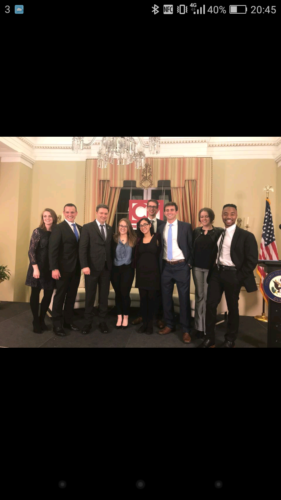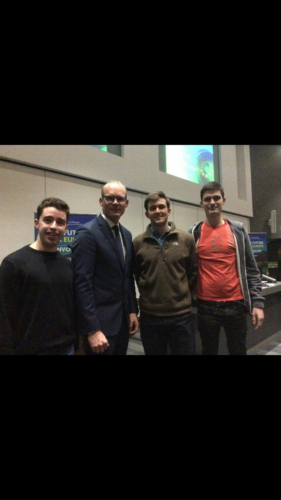As I approach the midpoint of my year in Ireland, I am both surprised how fast the first half went by and looking forward to all that is to come in 2018.
The “homestretch” of last semester saw me mostly anchored at UCD focusing on papers, projects, and class functions. My favorite course that I took in the fall – The Geopolitics of Brexit – occupied much of that time. Already interested in the consequential UK referendum while studying foreign affairs in college, this unique module deepened my conception of the underpinnings of euroscepticism and the consequences of disintegration. Unique in that the course scrutinized an ongoing event, the structure of the class involved visiting academic experts from around Europe leading an engaged seminar each week. At the end of the course, each project group presented their “Brexit scenario” (i.e.: what we predicted would happen and why, as well as providing recommendations) to a selected panel of policymakers and businessmen.
In my work for this course, among others, I developed a strong respect for Irish diplomacy. My research mostly centered around the complex issue of the Irish border – the most divisive of the three negotiating points during “Phase I” of the UK-EU negotiations. While Westminster paid lip service to avoiding a hard border on the island of Ireland, no concrete details were provided to reassure Dublin and Brussels. For the Republic of Ireland, the uncertainty created by the situation – and the prospect that their voice would be muted as talks progressed further – was not good enough. A rigid border would greatly disrupt economies on either side and acutely harm Irish farmers. Moreover, the need to sustain a de-militarized border, and thus the sanctity of the 1998 Good Friday Agreement brokered by one Senator George Mitchell, is critical for continued peace between the six counties of the Ulster and the Republic of Ireland.
As such, the Irish government resolved not to let the issue go delayed or de-emphasized any longer. They crystallized their position and sought solidarity from their EU partners. Their persistent diplomacy forced Theresa May’s government to finally dedicate full attention to the border question – and provide concrete reassurance that the border would remain open (in the event that the UK does not settle on a customs arrangement that “fully aligns” with EU rules in the North by their preliminary departure date March of 2019).

A few Mitchell’s with Charge d’affaires Reece Smyth at the U.S. Ambassador’s residence for a Thanksgiving reception – complete with deviled eggs!
The speed with which the Irish built consensus among its 26 EU partners and forced the hand of the UK – all during a domestic political scandal that threatened to take down the Fine Gael government – should not be undervalued.
The triumph of Irish diplomacy last fall serves as a microcosm of the principled and steadied nature that Irish folks go about their business. They are not bombastic, they are not duplicitous. They are transparent and reasoned. In a world infused with plenty of deception and bluster in the public sphere, world leaders and citizens alike would do well to learn from this small island on Europe’s periphery.

A couple classmates and I talking with Foreign Minister Simon Coveney about Brexit before his first student engagement speech on “The Future of Europe” – at UCD.
.
